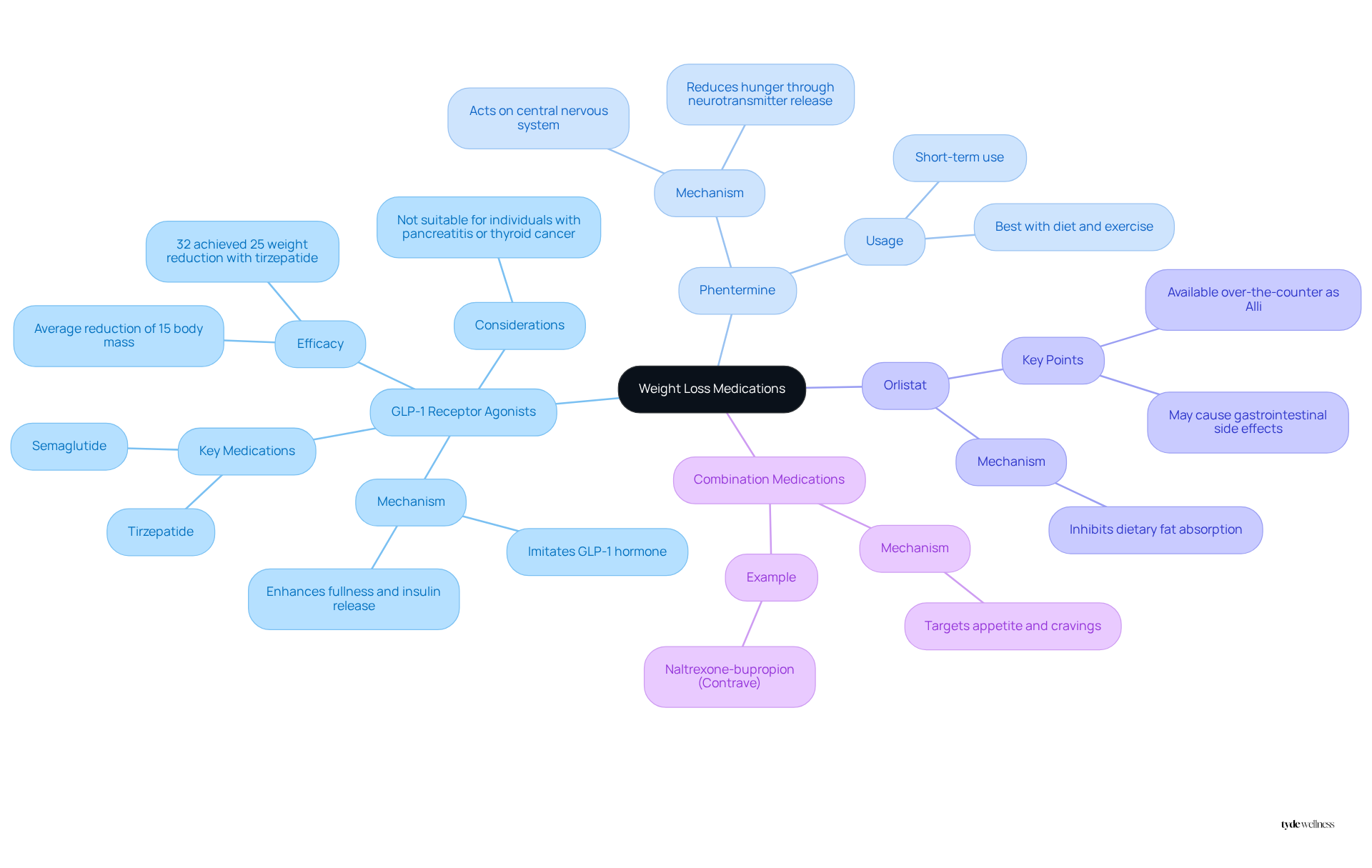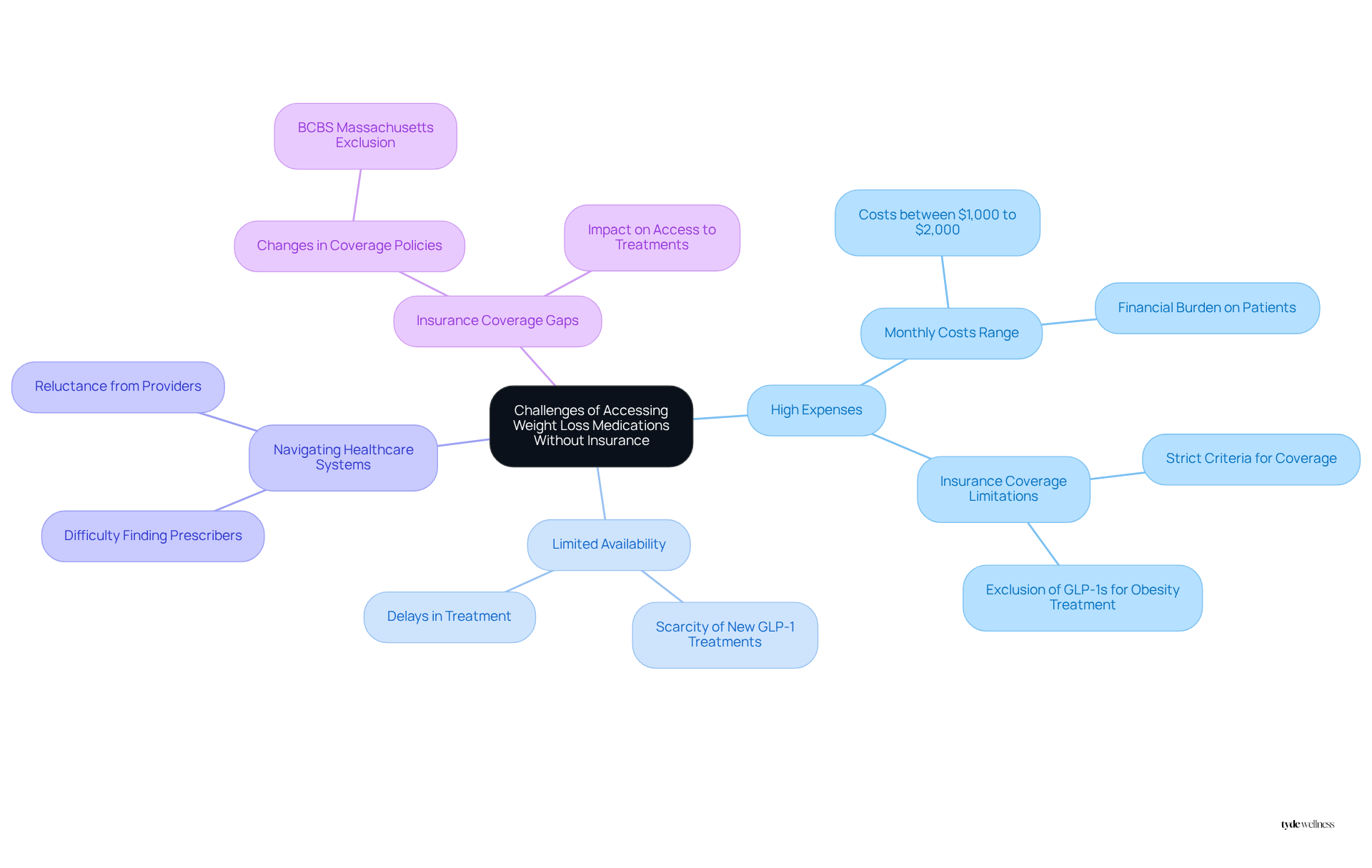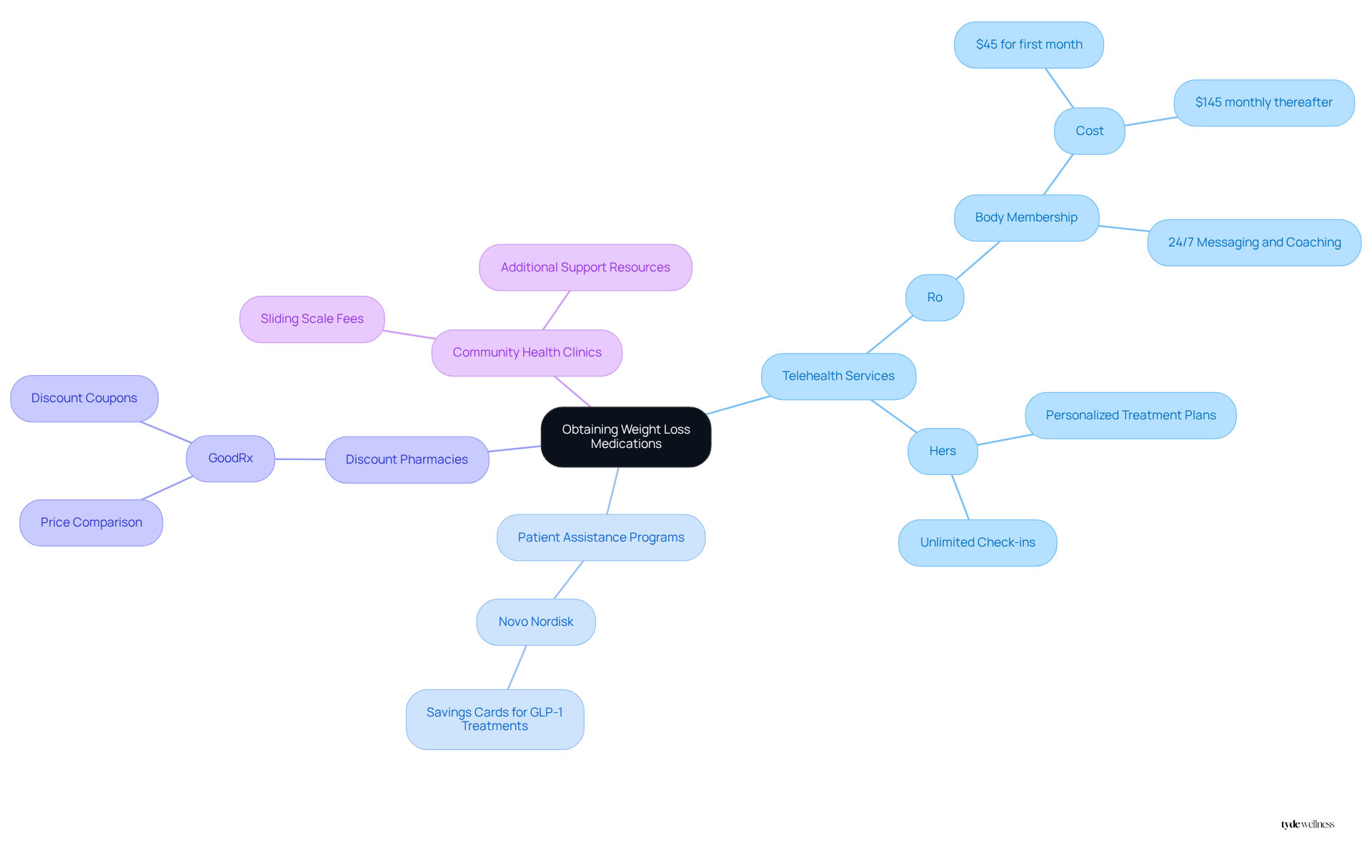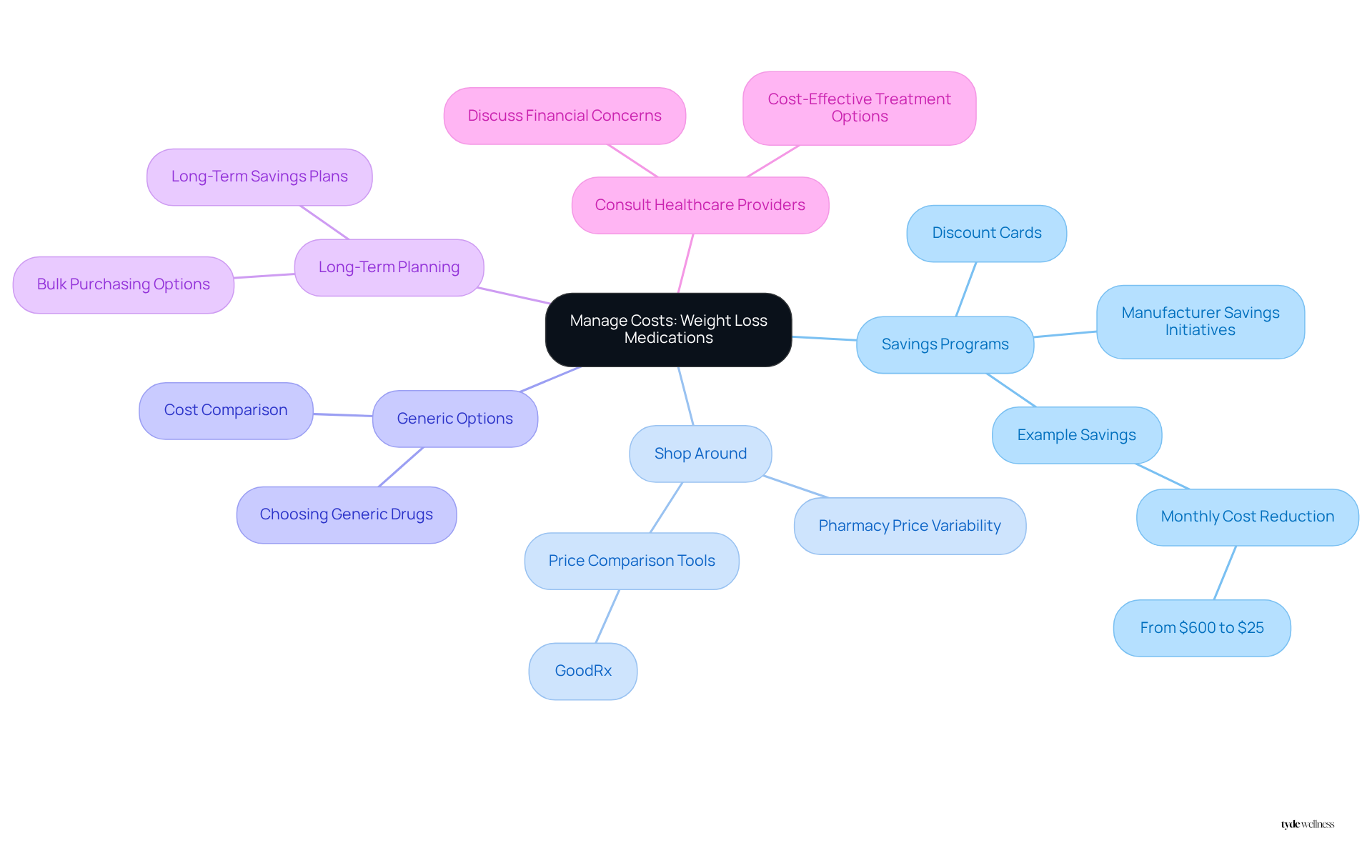Overview
To access weight loss medication without insurance, individuals can explore alternatives such as:
- Telehealth services
- Patient assistance programs
- Discount pharmacies
These options not only provide lower-cost solutions but also offer ongoing support. By utilizing these strategies, individuals can significantly reduce out-of-pocket expenses, thereby improving access to necessary treatments. This approach addresses the financial barriers many face when seeking effective weight loss solutions.
Introduction
Navigating the complex landscape of weight loss medications can be challenging, particularly for individuals without insurance coverage. The rising costs of these treatments often exceed thousands of dollars monthly, placing many in a difficult position as they seek effective solutions for weight management. This article provides a comprehensive guide to accessing weight loss medications without insurance. It explores alternative options and strategies to help overcome financial barriers.
How can individuals obtain the necessary treatments while addressing issues of affordability and availability?
Understand Weight Loss Medications: Types and Mechanisms
Weight loss medications can be categorized into several key types, each with distinct mechanisms that support weight management:
- GLP-1 Receptor Agonists: Medications such as Semaglutide and Tirzepatide, available at Tyde Wellness, imitate the hormone glucagon-like peptide-1, essential for appetite control and insulin release. These FDA-approved treatments improve sensations of fullness, reduce appetite, and delay gastric emptying, resulting in a considerable reduction in body mass. Remarkably, tirzepatide, a next-generation hormone treatment, provides even better outcomes for appetite regulation and substantial reduction in body mass. In clinical studies, women utilizing specific therapies have noted an average reduction in mass of approximately 15% after 68 weeks, demonstrating their efficacy in practical environments. However, it’s important to note that GLP-1 medications may not be suitable for everyone, particularly individuals with a history of pancreatitis or thyroid cancer. Decisions regarding their use should involve a thorough discussion with a healthcare provider. At Tyde Wellness, we also offer extensive support services, including customized nutrition plans and continuous coaching, to improve your journey towards achieving a healthier body.
- Phentermine: This appetite suppressant acts on the central nervous system to reduce hunger. Typically prescribed for short-term use, phentermine is most effective when combined with a structured diet and exercise plan. It functions by encouraging the release of neurotransmitters that assist in regulating appetite, making it a favored option for initial reductions in body mass.
- Orlistat: Available over-the-counter as Alli, orlistat functions by inhibiting the absorption of dietary fats in the intestines. This results in a reduction in calorie consumption, aiding in slimming efforts. Users may encounter gastrointestinal side effects, but it can be a beneficial choice for those seeking to manage their body composition through dietary modifications.
- Combination Medications: Certain medications for shedding pounds, like naltrexone-bupropion (Contrave), employ a dual mechanism to tackle both appetite and cravings. By targeting multiple pathways, these treatments can enhance weight loss outcomes for individuals struggling with obesity.
Recent studies have highlighted the mechanisms of these drugs, revealing that GLP-1 receptor agonists, for instance, not only reduce hunger but also improve metabolic health markers. At Tyde Wellness, we emphasize the significance of tailored treatment plans, as not everyone reacts the same way to these therapies. As Dr. Louis Aronne observes, “The pathways that govern body mass are incredibly complicated,” emphasizing the necessity for customized strategies. Decisions regarding their use should always involve a thorough discussion with a healthcare provider to ensure the best approach for individual health needs.

Identify Challenges of Accessing Weight Loss Medications Without Insurance
Accessing weight loss medications without insurance can present several significant challenges:
- High Expenses: The monthly cost for slimming drugs can range from $1,000 to $2,000, making them unaffordable for many. This financial burden is intensified by insurance plans that often impose strict criteria for coverage, which can leave individuals seeking weight loss medication without insurance.
- Limited Availability: Newer GLP-1 treatments may not be readily available at all pharmacies, complicating the process of obtaining prescriptions. This scarcity can lead to delays in treatment and frustration for patients eager to embark on their journey toward a healthier body.
- Navigating healthcare systems can be difficult when searching for weight loss medication without insurance, as finding healthcare providers willing to prescribe treatments for body mass reduction can be a challenge. Patients often encounter reluctance from providers who may be hesitant to prescribe treatments that lack insurance support.
- Many patients face challenges due to insurance coverage gaps that affect their access to weight loss medication without insurance. For example, starting January 2024, BCBS Massachusetts will restrict coverage for GLP-1s to type 2 diabetes, leaving numerous individuals without access to effective obesity treatments.
Understanding these difficulties is crucial for individuals seeking for effective health management.

Explore Alternative Options for Obtaining Weight Loss Medications
If you find yourself without insurance coverage for weight loss medications, consider these alternatives:
- Telehealth Services: Online platforms such as Ro and Hers provide consultations with licensed healthcare professionals who can prescribe treatments for weight loss at competitive rates. These services often include ongoing support, facilitating effective weight management.
- Patient Assistance Programs: Numerous pharmaceutical companies, including Novo Nordisk, offer patient assistance programs that provide savings cards for their GLP-1 treatments. These programs can significantly without insurance, making treatments more affordable for those in need.
- Discount Pharmacies: Some pharmacies present discount programs or coupons that can lower prescription costs. Websites like GoodRx enable you to compare prices across various pharmacies, ensuring you find the best available deal.
- Community Health Clinics frequently offer sliding scale fees based on income, enhancing access to weight loss medication without insurance for individuals. These clinics may also provide additional support and resources for managing body mass.
Furthermore, consider exploring Tyde Wellness’s comprehensive support programs, which include hormone balance through safe GLP-1 and HRT options, custom fitness plans to rebuild strength, and smart nutrition guides to curb cravings. Many patients can anticipate losing 5-15% of their body mass over several months with these programs, enhancing their management journey and improving overall quality of life.
Discover Tyde Wellness’s programs today to overcome financial obstacles and achieve your fitness objectives.

Manage Costs: Strategies for Affordable Access to Weight Loss Medications
To effectively manage costs when accessing weight loss medications, consider the following strategies:
- Utilize Savings Programs: Leverage manufacturer savings initiatives and discount cards, which can significantly reduce drug costs. For instance, some patients have reported reductions in their monthly expenses from $600 to as low as $25 with proper coverage.
- Shop Around: Medication prices can vary dramatically between pharmacies. Utilize price comparison tools like GoodRx to available in your area, as some pharmacies have begun to lower their prices due to increased competition.
- Consider Generic Options: Whenever feasible, choose generic versions of drugs. These alternatives can be substantially less expensive than their brand-name counterparts, making them a viable option for budget-conscious consumers.
- Plan for Long-Term Use: If you anticipate requiring treatment for an extended duration, inquire about bulk purchasing options or long-term savings plans that pharmacies may provide. This approach can lead to significant savings over time.
- Consult with Healthcare Providers: Openly discuss your financial concerns with your healthcare provider. They may provide insights into cost-effective options or recommend remedies that are more affordable, ensuring you receive the necessary treatment without financial strain.
By implementing these strategies, you can enhance your access to weight loss medications while keeping your budget in check.

Conclusion
Navigating the landscape of weight loss medications without insurance can be daunting; however, it is achievable with the right knowledge and strategies. Understanding the types of medications available, recognizing the challenges of access, exploring alternative options, and managing costs can empower individuals on their weight loss journey.
Key points discussed include various categories of weight loss medications, such as:
- GLP-1 receptor agonists
- phentermine
- orlistat
Each with unique mechanisms and considerations. The challenges of high costs, limited availability, and navigating healthcare systems are highlighted, emphasizing the need for informed decision-making. Furthermore, alternative avenues such as:
- telehealth services
- patient assistance programs
- discount pharmacies
offer practical solutions for those without insurance coverage.
Ultimately, the pursuit of effective weight loss medications should not be hindered by financial constraints. By leveraging available resources and adopting strategic approaches to cost management, individuals can access the treatments they need. Embracing these options enhances the likelihood of achieving weight loss goals and contributes to overall health and well-being. Taking proactive steps today can pave the way for a healthier tomorrow.
Frequently Asked Questions
What are the main types of weight loss medications?
The main types of weight loss medications include GLP-1 receptor agonists, phentermine, orlistat, and combination medications.
How do GLP-1 receptor agonists work?
GLP-1 receptor agonists, such as Semaglutide and Tirzepatide, imitate the hormone glucagon-like peptide-1, which helps control appetite and release insulin. They improve sensations of fullness, reduce appetite, and delay gastric emptying, leading to significant reductions in body mass.
What are the potential benefits of using tirzepatide?
Tirzepatide provides enhanced outcomes for appetite regulation and substantial reductions in body mass, with clinical studies showing an average mass reduction of approximately 15% after 68 weeks for women using specific therapies.
Are GLP-1 medications suitable for everyone?
No, GLP-1 medications may not be suitable for individuals with a history of pancreatitis or thyroid cancer. It’s important to have a thorough discussion with a healthcare provider regarding their use.
What is phentermine and how does it work?
Phentermine is an appetite suppressant that acts on the central nervous system to reduce hunger. It is typically prescribed for short-term use and is most effective when combined with a structured diet and exercise plan.
How does orlistat aid in weight loss?
Orlistat, available over-the-counter as Alli, inhibits the absorption of dietary fats in the intestines, resulting in reduced calorie consumption and aiding in weight loss efforts. However, users may experience gastrointestinal side effects.
What are combination medications for weight loss?
Combination medications, such as naltrexone-bupropion (Contrave), use a dual mechanism to address both appetite and cravings, potentially enhancing weight loss outcomes for individuals struggling with obesity.
Why is it important to have tailored treatment plans for weight loss medications?
Tailored treatment plans are crucial because individuals may react differently to these therapies. Customized strategies ensure the best approach for individual health needs, as emphasized by Dr. Louis Aronne regarding the complexity of body mass regulation.
List of Sources
- Understand Weight Loss Medications: Types and Mechanisms
- GLP-1s work but when they’re stopped, the effects stop too: Expert (https://abcnews.go.com/Health/glp-1s-work-stopped-effects-stop-expert/story?id=124009776)
- Study identifies benefits, risks linked to popular weight-loss drugs | WashU Medicine (https://medicine.washu.edu/news/study-identifies-benefits-risks-linked-to-popular-weight-loss-drugs)
- Head-to-Head Trial Compares Weight Loss Drugs (https://news.weill.cornell.edu/news/2025/05/head-to-head-trial-compares-weight-loss-drugs)
- Identify Challenges of Accessing Weight Loss Medications Without Insurance
- Why Aren’t People Who Need Weight Loss Drugs Getting Them? (https://medicine.yale.edu/news-article/why-arent-people-who-need-weight-loss-drugs-getting-them)
- How South Florida patients are fighting for access to drugs like Ozempic, Wegovy and Mounjaro (https://cbsnews.com/miami/news/the-high-cost-of-weight-loss-how-patients-are-fighting-for-access-to-breakthrough-medications)
- The cost of weight loss drugs is finally dropping. How low can prices go? (https://nbcnews.com/health/health-news/cost-weight-loss-drugs-wegovy-zepbound-how-low-prices-down-rcna205911)
- Major insurance changes are coming to GLP-1 drugs for weight loss. Here’s how that could affect patients | CNN (https://edition.cnn.com/2025/07/01/health/zepbound-wegovy-insurance-cvs-bcbs-weight-loss)
- The skyrocketing cost of weight-loss drugs has state Medicaid programs looking for a solution (https://apnews.com/article/ozempic-wegovy-medicaid-weight-loss-glp1-dd34e5d76b660550dad73dc3069083ce)
- Explore Alternative Options for Obtaining Weight Loss Medications
- Express Scripts expands Patient Assurance Program to drive affordability and access to GLP-1s (https://evernorth.com/articles/express-scripts-expands-patient-assurance-program-drive-affordability-and-access-glp-1s)
- In the war for GLP-1 patients, Novo Nordisk leans on telehealth (https://statnews.com/2025/05/23/wegovy-novo-nordisk-glp-1-weight-loss-ro-life-md-telehealth)
- Novo Nordisk opens weight loss drug Wegovy to telehealth; Hims & Hers shares rocket 23% (https://cnbc.com/2025/04/29/novo-nordisk-wegovy-telehealth.html)
- 13 Places to Get the Best GLP-1s for Weight Loss in 2025 (https://everydayhealth.com/diet-nutrition-products/glp-1s-online)
- Manage Costs: Strategies for Affordable Access to Weight Loss Medications
- The cost of weight loss drugs is finally dropping. How low can prices go? (https://nbcnews.com/health/health-news/cost-weight-loss-drugs-wegovy-zepbound-how-low-prices-down-rcna205911)
- Improving access and affordability to high-cost weight management drugs (https://cvshealth.com/news/pbm/improving-access-and-affordability-to-high-cost-weight-management-drugs.html)
- Institute for Clinical and Economic Review Releases Obesity Medications White Paper Examining Strategies to Ensure Affordable Access – ICER (https://icer.org/news-insights/press-releases/institute-for-clinical-and-economic-review-releases-obesity-medications-white-paper-examining-strategies-to-ensure-affordable-access)
- Weight-Loss Drugs Are Now Selling Direct to Consumer. What It Means for Big Pharma. (https://barrons.com/articles/zepbound-wegovy-lillydirect-novocare-weight-loss-drugs-1d8c2eae)
- Expanding Access to Weight-Loss Drugs Could Save Thousands of Lives A Year, Study Finds (https://medicine.yale.edu/news-article/expanding-access-to-weight-loss-drugs-could-save-thousands-of-lives-annually-study-finds)



